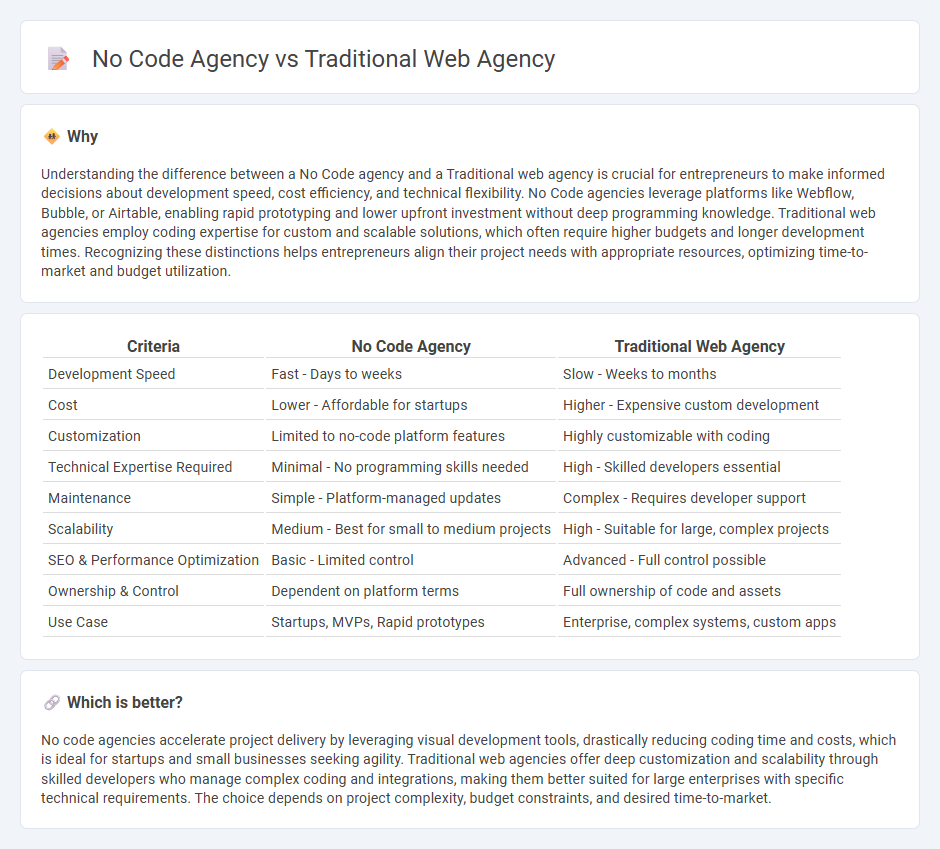
No-code agencies leverage visual development platforms to build websites and applications rapidly without extensive coding, enabling faster project delivery and lower costs. Traditional web agencies rely on custom coding and development, offering highly tailored solutions but often requiring longer timelines and higher budgets. Explore the advantages and challenges of both approaches to determine the best fit for your business needs.
Why it is important
Understanding the difference between a No Code agency and a Traditional web agency is crucial for entrepreneurs to make informed decisions about development speed, cost efficiency, and technical flexibility. No Code agencies leverage platforms like Webflow, Bubble, or Airtable, enabling rapid prototyping and lower upfront investment without deep programming knowledge. Traditional web agencies employ coding expertise for custom and scalable solutions, which often require higher budgets and longer development times. Recognizing these distinctions helps entrepreneurs align their project needs with appropriate resources, optimizing time-to-market and budget utilization.
Comparison Table
| Criteria | No Code Agency | Traditional Web Agency |
|---|---|---|
| Development Speed | Fast - Days to weeks | Slow - Weeks to months |
| Cost | Lower - Affordable for startups | Higher - Expensive custom development |
| Customization | Limited to no-code platform features | Highly customizable with coding |
| Technical Expertise Required | Minimal - No programming skills needed | High - Skilled developers essential |
| Maintenance | Simple - Platform-managed updates | Complex - Requires developer support |
| Scalability | Medium - Best for small to medium projects | High - Suitable for large, complex projects |
| SEO & Performance Optimization | Basic - Limited control | Advanced - Full control possible |
| Ownership & Control | Dependent on platform terms | Full ownership of code and assets |
| Use Case | Startups, MVPs, Rapid prototypes | Enterprise, complex systems, custom apps |
Which is better?
No code agencies accelerate project delivery by leveraging visual development tools, drastically reducing coding time and costs, which is ideal for startups and small businesses seeking agility. Traditional web agencies offer deep customization and scalability through skilled developers who manage complex coding and integrations, making them better suited for large enterprises with specific technical requirements. The choice depends on project complexity, budget constraints, and desired time-to-market.
Connection
No code agencies and traditional web agencies are connected through their shared goal of delivering digital solutions but differ in technical approaches; no code agencies accelerate development using visual platforms like Webflow or Bubble, reducing time and cost. Traditional web agencies provide custom-coded websites using languages such as HTML, CSS, and JavaScript, allowing more complex and tailored functionalities. Both models collaborate by integrating no code tools for rapid prototyping while relying on traditional coding for scalable, enterprise-level projects.
Key Terms
Custom Development
Traditional web agencies excel in custom development by offering tailored code solutions that meet specific client requirements, leveraging extensive programming expertise and flexible technology stacks. No-code agencies emphasize rapid deployment and cost efficiency by utilizing visual development platforms that minimize the need for complex coding, ideal for projects with standard functionalities and quicker turnaround times. Explore more insights on how to choose the right agency for your custom web development needs.
Automation Tools
Traditional web agencies typically rely on custom coding and manual processes to build and maintain websites, resulting in longer development cycles and higher costs. No code agencies leverage automation tools such as Zapier, Integromat, and Webflow to accelerate project delivery, reduce errors, and enable rapid prototyping without extensive programming knowledge. Explore how automation tools transform web development workflows and enhance efficiency by diving deeper into this comparison.
Scalability
Traditional web agencies often require extensive custom coding to achieve scalability, leading to longer development times and higher maintenance costs. No code agencies leverage platforms like Webflow, Bubble, or Airtable to quickly build scalable websites and applications without deep programming skills, enhancing flexibility and reducing time-to-market. Explore the advantages of each approach to determine the best fit for your business growth and scalability needs.
Source and External Links
All-Inclusive vs. Traditional Marketing Agencies Guide - Traditional web agencies typically focus on advertising, managing campaigns like Google and social ads, creating ad content, and tracking analytics such as views and conversions to strategize future campaigns, while also developing landing pages and related content for ads.
Traditional Marketing Services | EZMarketing, Lancaster, PA - Traditional marketing agencies offer services such as branding, logo design, print ads, and direct mail, often complementing digital efforts to help small businesses shine both offline and online through integrated marketing approaches.
Webflow vs. Traditional Web Development for SAAS Startups - Flowout - Traditional web development entails custom coding in HTML, CSS, JavaScript, often with frameworks like React or Angular, requiring professional developer teams to build highly flexible and customizable websites, unlike no-code platforms.
 dowidth.com
dowidth.com